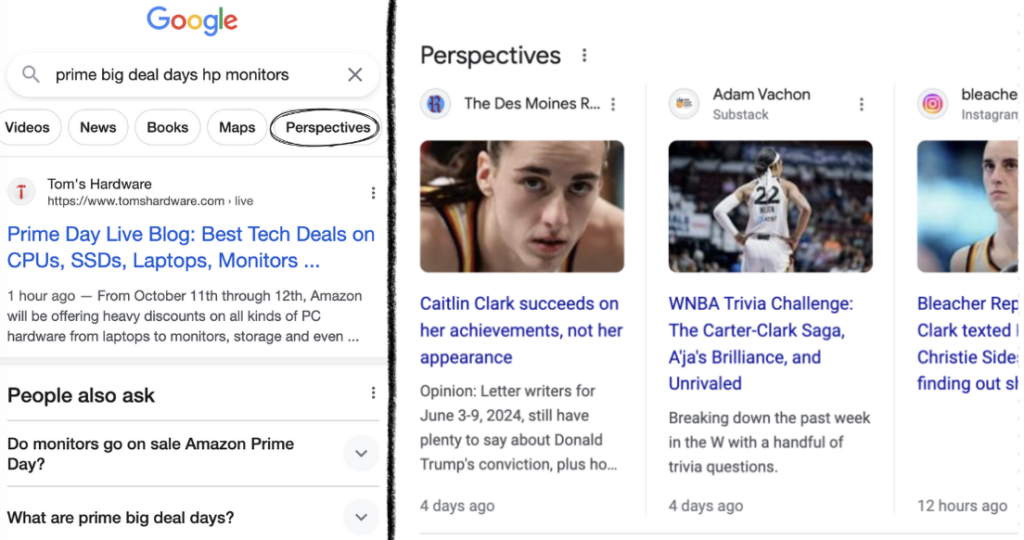Introduced in June 2023, Google Perspectives is a go-to source for insightful perspectives online, revolutionizing both branded and non-branded searches. By highlighting third-party opinions, it offers a fresh approach to search results.
Let’s explore what Google Perspectives means for your search strategies and how you can optimize for this new feature.
What are Google Perspectives?
Google Perspectives is a tab within Google’s search results that aggregates content from third-party websites, social media platforms, community threads and more. Most notably, it excludes direct content from the brands’ websites. It also shows up as a carousel feature.

When you search for a company’s brand name and look in Google Perspectives, you’ll find YouTube videos, shorts, Reddit threads, Quora responses and Instagram videos.
For more general queries, like “Who is the best telecom company,” Google draws from a wide range of sources to offer diverse viewpoints.
Why should SEOs care?
Google Perspectives introduces a fundamental shift in how search results are displayed and accessed. Here’s why SEOs should take note:
Search result evolution: Google Perspectives expands search results to include content from diverse third-party sources, meaning that SEO strategies must evolve to encompass not just on-site optimization but also off-site content and engagement on these platforms.
User-centric approach: The emphasis on diverse viewpoints and experiences reflects a broader shift towards a user-centric approach in search. Websites need to focus on creating content that not only ranks well but also provides value and engages users across various platforms.
Social proof and reputation management: Positive discussions and content about a brand on third-party sites can enhance its visibility, highlighting the need for proactive reputation management in SEO strategy.
Brand visibility and authority: Being featured in Google Perspectives can significantly boost a brand’s visibility and authority. Websites can leverage this opportunity by creating compelling, shareable content that resonates with their audience and aligns with Google’s quality guidelines.
Comprehensive content strategy: A comprehensive content strategy must extend beyond the brand’s website. This means engaging with platforms where conversations about the brand are happening and creating diverse content that addresses user queries and interests.
Google Perspectives SEO Checklist
Create valuable content: Developing relevant content is crucial for Google Perspectives for SEO. This content should not only be informative and engaging but also optimized for user experience and expertise. By providing unique insights and expert knowledge, you can increase the chances of your content being featured.
Engage with platforms: Actively engaging with platforms where discussions about your brand are happening is essential. This includes social media platforms like Twitter, Facebook and LinkedIn, as well as forums and community websites. Participating in these discussions and sharing valuable information can boost your brand’s visibility and engagement.
Optimize for customer experience: Optimizing for customer experience involves ensuring that your website and content are user-friendly, accessible and provide value to your audience. This can include improving website speed, optimizing for mobile devices and creating content that addresses the needs and interests of your target audience.
Understand customer sentiment: Monitoring and understanding your customers’ online sentiment towards your brand is crucial for Google Perspectives for SEO. This involves using tools like social listening platforms to track mentions of your brand online and gather insights into how your audience perceives your brand. By understanding customer sentiment, you can tailor your content and messaging to better resonate with your audience.
Set up Google alerts: Setting up Google Alerts is a simple yet effective way to track mentions of your brand online. Google Alerts will notify you whenever your brand is mentioned in news articles, blog posts or other online content, allowing you to stay informed about how your brand is being perceived or represented online.
Use third-party sentiment tools: Utilizing third-party sentiment tools like Brandwatch and Talkwalker can provide valuable insights into public sentiment toward your brand. These tools use advanced algorithms to analyze social media, news articles and other online content to gauge sentiment and provide actionable insights for improving your brand’s reputation.
Optimize for third-party websites: Optimizing your presence on third-party websites like Quora and Reddit can significantly enhance your brand’s visibility and reputation. This involves actively participating in discussions, providing valuable insights and engaging with users to build a positive presence on these platforms. By optimizing for third-party websites, you can increase the chances of your content being featured in Google Perspectives and improve your overall online reputation.
Final Thoughts
Google Perspectives is more than just a new feature; it’s a paradigm shift in how information is curated and presented in search results. By focusing on amplifying diverse voices and experiences, Google is challenging brands to think beyond their websites and engage more deeply with the broader digital ecosystem.
For brands and marketers, adapting to this shift means embracing a multi-platform content strategy that prioritizes engagement, authenticity and expertise. We all should be doing this anyway.
The opportunity to influence brand perception through Google Perspectives is significant, but it requires a thoughtful, proactive approach to content creation and community engagement. This is your chance to embrace this challenge and turn it into an opportunity to highlight the best of what your brand has to offer.
